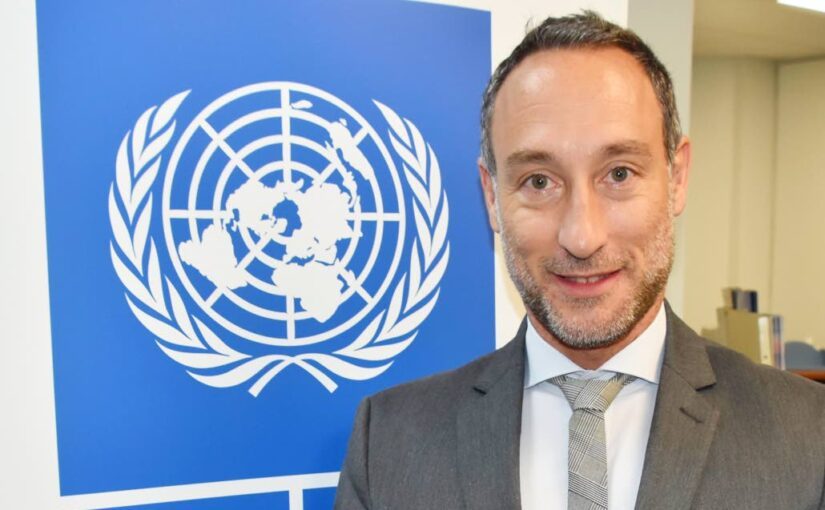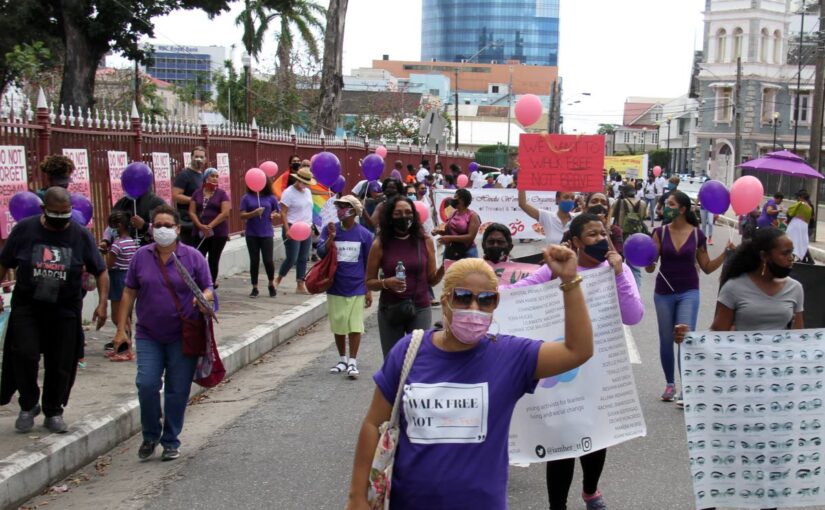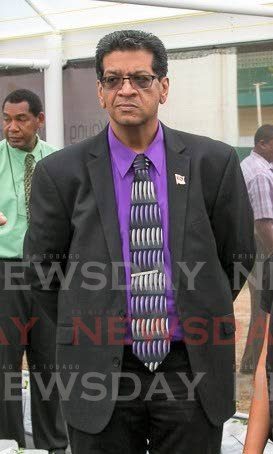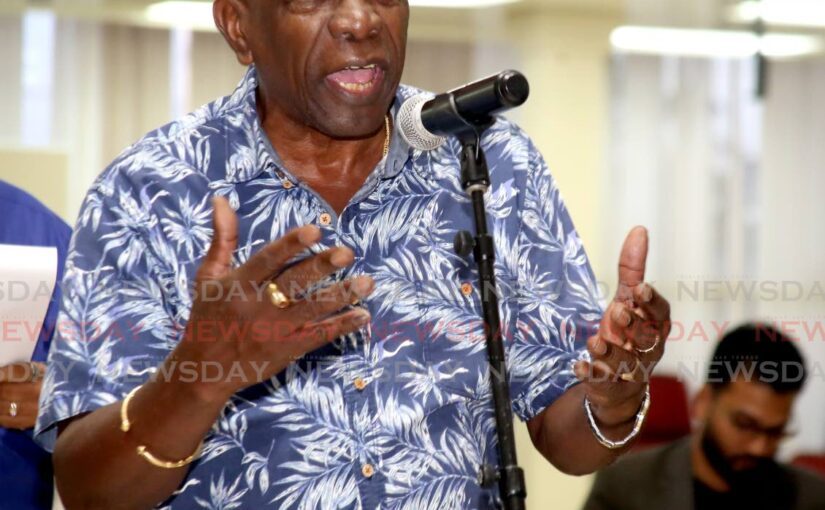FARIHAH MOHAMMED IN A WORLD where conflicts persist and human rights abuses continue to claim innocent lives, women have consistently emerged as...
Vous n'êtes pas connecté
- English
- Français
- عربي
- Español
- Deutsch
- Português
- русский язык
- Català
- Italiano
- Nederlands, Vlaams
- Norsk
- فارسی
- বাংলা
- اردو
- Azərbaycan dili
- Bahasa Indonesia
- Հայերեն
- Ελληνικά
- Bosanski jezik
- українська мова
- Íslenska
- Türkmen, Түркмен
- Türkçe
- Shqip
- Eesti keel
- magyar
- Қазақ тілі
- Kalaallisut ; kalaallit oqaasii
- Lietuvių kalba
- Latviešu valoda
- македонски јазик
- Монгол
- Bahasa Melayu ; بهاس ملايو
- ဗမာစာ
- Slovenščina
- тоҷикӣ ; toğikī ; تاجیکی
- ไทย
- O'zbek ; Ўзбек ; أۇزبېك
- Tiếng Việt
- ភាសាខ្មែរ
- རྫོང་ཁ
- Soomaaliga ; af Soomaali
Rubriques :
 Maroc - NEWSDAY.CO.TT - A la Une - 04/Jan 07:38
Maroc - NEWSDAY.CO.TT - A la Une - 04/Jan 07:38
SoE: 2024’s lessons from the world
UGO BLANCO TWENTY TWENTY-FOUR has not been the best year for the world; all red alarms went off. Humanity is under siege. Over the past decade the number of active armed conflicts worldwide has reached unprecedented levels. Last year there were more than 120 armed conflicts ranging around the world, according to the International Federation of the Red Cross, one of the most important humanitarian actors our system has ever created. More bad news: both global warming and biodiversity loss have intensified in 2024, posing significant challenges to environmental sustainability and, therefore, the future of planet Earth. This year’s Living Planet Report from the World Wildlife Fund reveals a catastrophic 73 per cent decline in the average size of monitored wildlife populations between 1970 and 2020. This alarming statistic highlights the rapid degradation of ecosystems and the pressing need to prioritise conservation efforts. We, as human societies, normally tend to have a plan to address all these challenges, but it seems that we are starting to run out of solutions. Last month I had the chance to meet Yuen Yuen Ang in South Africa. She is a professor of political economy at Johns Hopkins University, known for her expertise in development, governance, and complex systems. Her message was bold: there is an urgent need to reset development paradigms considering the interconnected crises – she talks about polycrisis – affecting the world today. Small and developing countries are running out of models. The United Nations Development Programme (UNDP) recently adjusted the way human development is measured in our world. The Planetary Pressures-Adjusted Human Development Index (PHDI) showed for the first time the environmental cost of human development by accounting for factors such as carbon emissions and material footprint alongside traditional development metrics. Unsurprisingly, developed nations, often with high Human Development Index (HDI) scores, experienced significant reductions in their PHDI due to their substantial environmental footprints, emphasising the unsustainable nature of their development practices. Alongside, the state of democracy in many countries long regarded as strongholds of stability and tradition is now raising some critical questions. As Prof Ang advocates, it feels like industrial-colonial models that prioritise mechanical, one-size-fits-all solutions are outdated. Top-down, Western-centric methods should be replaced by inclusive, localised strategies, fostering experimentation and bottom-up feedback, so societies can effectively transform these crises into meaningful opportunities. Her concept of "polytunity" resonates deeply with me, as well as the call for rethinking governance, valuing diverse solutions, and addressing the moral and ecological dimensions of progress. The world we want demands a new approach. Given the polycrisis and its interconnected nature, attempting to address these issues with isolated national solutions instead of a co-ordinated multilateral approach simply does not make sense. However, this is precisely what the world seems to be witnessing nowadays. The inclination of many nations to focus inwardly, prioritising national interests over collective global action, is deeply concerning. The interconnected crises of 2024 have demonstrated that challenges such as climate change, armed conflicts, crime and violence, and biodiversity loss transcends borders and now demands a unified global response. Without a robust multilateral framework, the ability to implement effective, long-term solutions remains severely limited, wasting limited resources and further exacerbating the crises we face. TT, while not immune to global challenges, has shown positive strides in addressing critical issues. The country’s commitment to renewable energy and economic diversification was evident on the global stage last year. At the United Nations General Assembly in September, Senator Amery Browne delivered a compelling statement underscoring the nation’s dedication to sustainable development and international co-operation, underscoring the inter-related efforts required to address these issues. Similarly, at COP29, representatives from the Ministry of Planning and Development highlighted TT’s proactive measures in the energy transition, emphasising the need for greater collaboration and innovation to tackle climate change effectively. Domestically, the recently announced budget offers promising signals of renewed focus on these key matters. These priorities indicate a forward-looking approach to building resilience and fostering sustainable growth. Crime remains a critical concern in TT, with the recent state of emergency reflecting broader societal challenges. These issues require a collaborative, comprehensive and inclusive approach. Crime prevention must be at the heart of a national strategy for crime reduction. Our country has some very notable examples such as the CariSecure and PACE Justice initiative’s that bring together multiple stakeholders including some external like the European Union. As the country approaches a general election in 2025, there is an opportunity to build on progress by fostering unity, trust, and engagement among all citizens. Strengthening communities and empowering youth is pivotal in navigating complex global and local challenges with purpose and resilience. As TT moves into 2025, UNDP remains committed to serving as a key partner for this region and this country’s people and institutions. By leveraging global, regional, and national expertise, fostering collaboration, and driving innovative solutions, UNDP is committed to supporting the country’s national priorities and development goals. Enhancing peace and security will be vital to fostering economic diversification in sectors such as tourism and food security while strengthening resilience. With a proactive stance. TT has the potential to emerge as a regional champion in the Caribbean, paving the way for a more sustainable and inclusive future for all. Ugo Blanco is the UNDP TT Resident Representative The post SoE: 2024’s lessons from the world appeared first on Trinidad and Tobago Newsday.
Articles similaires
Post-G20 Rio: Promises To Address Root Causes Of Migration, Global Displacement – Analysis
By Aline Barros As G20 leaders convened in Rio de Janeiro, Brazil, in November, they set an ambitious goal to lift 600 million people out of...
Charting the future: Vision of a resilient, productive 2025
VASHTI G GUYADEEN As 2025 begins, the TT Chamber reflects on a year of transformative progress and pragmatic optimism. Against a backdrop of global...
Let’s build stronger Trinidad and Tobago together
THE EDITOR: As we approach a new year, it is a time for reflection and resolve. TT faces significant challenges that threaten our progress, but with...
Generation Hope: Kashmir’s Youth Forging Paths To Peace Amidst Challenges – OpEd
Viewing Kashmiri society through the lens of peace and conflict studies, it can be argued that conflict management though has been an ongoing process...
Major global development of 2024: Political, conflict, and environmental shifts
The year 2024 has been a fast-paced one in terms of political shifts, deadly conflicts, and regional developments. As we approach the end of this...
Independent chair for fire probe vital
JACK WARNER THE TRAGIC deaths of Lisa Morris-Julian, a former mayor of Arima and, most recently, a minister in the Ministry of Education, and two of...
Addressing East Asia’s Demographic Crisis: The Promise Of Four-Day Workweek – Analysis
East Asia has been currently grappling with an unprecedented demographic crisis marked by plunging birth rates and aging populations. The East Asian...
Trump 2.0 And Bangladesh 2.0: Redefining Dynamics In A New Era Of Bilateral Relations – Analysis
Donald Trump’s re-election as the 47th President of the United States and his anticipated inauguration on January 20, 2025, herald the beginning...
Fresh Rohingya Influx Puts Bangladesh Under Pressure Amid Myanmar’s Escalating Conflict – Analysis
In the midst of intensifying clashes between Myanmar's junta government and Arakan Army rebels, Bangladesh has faced a new wave of Rohingya...
Les derniers communiqués
-
Aucun élément




